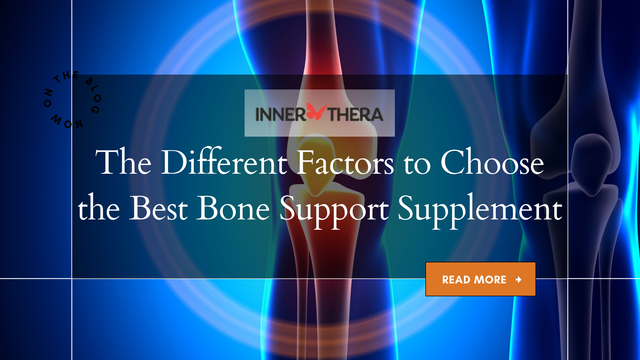
For bone health maintenance, a good diet and exercise can also be a good way. Nevertheless, even in a healthy regime, it can be challenging to get all of the nutrients that your bone requires from the diet alone. This is where bone supplements come into play. Selecting the right bone supplement is a challenge due to the wide variety of products on the market, all promising extraordinary outcomes. Understanding the essential factors to consider when selecting the best bone support supplement for your needs will help ensure you’re making the best choice for your bone health.
Important Considerations in Choosing an Optimal Bone Support Supplement
Before diving into your search for the best bone support supplement, it's essential to understand what your bones truly need. There can be beneficial effects of the right supplement for providing a variety of essential nutrients, calcium, magnesium, and vitamin D, which all have significant roles in bone health.
Nutrient Profile
A bone supplement should contain a nutritionally complete profile of nutrients, including calcium, magnesium, and vitamin D. Calcium is the most recognized nutrient for bone strength, playing a paramount role in bone strengthening and fracture prevention. Magnesium is another important contributor, facilitating calcium absorption and controlling calcium levels in the bone. Vitamin D is also important as it effectively enables calcium absorption.
To secure the best results, find a supplement containing these essential nutrients in the proper ratio. The most effective bone supplement generally contains calcium, magnesium, and vitamin D to improve absorption.
Quality of Ingredients
Not all bone supplements are created equal. The importance of the quality of ingredients in selecting the optimal bone supplement should not be overlooked. Integrins are high-fidelity, natural, and effective molecular gates for transiting biological information across the plasma membrane to regulate the cell.

For instance, calcium carbonate is a regular component in many bone products. However, it can cause digestive discomfort for some individuals. Calcium citrate, on the other hand, is more readily digested and absorbed. Always search for reliable brands that focus on the high quality of the ingredients used and provide information regarding their source.
Bioavailability
The bioavailability of the best bone support supplement is the fraction of the supplement's ingredients that the body actually consumes and turns into usable ingredients. Though a supplement may contain every nutrient-requiring component, low bioavailability can limit its efficacy.
When selecting the ideal bone supplement, prefer products that contain bioavailable vitamins and minerals. For example, magnesium citrate and vitamin D3 are more bioavailable than their respective counterparts. Bioavailable supplements that can provide the best solution to your bone health problems are more probable for us to get optimal results.
Dosage and Formulation
The appropriate dosage plays an important role in the successful use of a bone supplement. Some people, due to their age, lifestyle, and general health, may need increased doses of calcium or vitamin D. Adhering to the recommended amount of the nutrient indicated on the product's label is crucial because excess of some nutrients leads to side effects.
Additionally, consider the formulation of the supplement. Pills, capsules, and powders are three of the most typical types of bone supplements. Capsules and tablets are easy to take but may not be easy for all humans to digest. However, powders can be diluted in drinks and thus can be easily drunk. Select a modality that is suitable to your way of life and individual preferences.
Additional Bone Health Benefits
Certain bone supplements contain additional ingredients that may help improve bone health. Collagen, for instance, is a protein that constitutes a significant fraction of skeletal bone structure. Supplements that contain collagén have been shown to help increase bone density and reduce bone loss. Further, vitamin K2 and zinc supplements have the potential to strengthen bones and decrease fracture risk.
If considering a bone supplement, do not omit those that can provide additional benefits. Nevertheless, ensure that these components are synergistic with those needed for bone health (e.g., calcium, magnesium, and vitamin D).
Certifications and Third-Party Testing
A reputable nutraceutical company will commonly have certifications that guarantee the quality and safety of the product. Search for certifications such as NSF Certified for Sport or GMP (Good Manufacturing Practices) to verify that the product is manufactured according to strict quality standards. Third-party testing, which is another important issue to consider to guarantee that the supplement is free from contamination and pure, is also very important.
Selecting the right bone supplement from a reliable brand with these certifications can provide peace of mind, that the product is safe and effective.
Conclusion
Selecting the best bone support supplement is an issue of the identification of personal requirements and attention to the factors determining bone health. From nutrient profiles to bioavailability and other health effects, every aspect contributes to ensuring that the supplement you select delivers optimal outcomes. With proper research and the right approach, you can make an informed decision to support your bone health now and in the future.